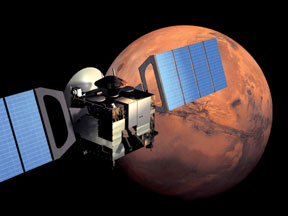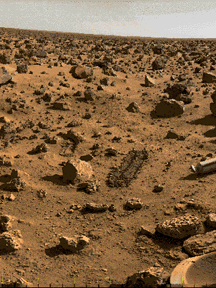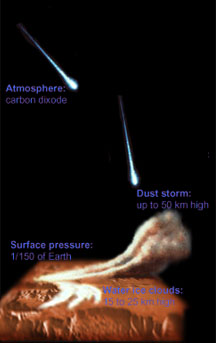Click on image for full size
Image courtesy European Space Agency (ESA) - Illustration by Medialab
Overview of the Mars Express Mission
The European Space Agency (ESA) launched a mission to Mars called "Mars Express" in June of 2003. The Mars Express spacecraft has two parts: an orbiter that will circle Mars for at least one Martian year (687 Earth days), and a lander named "Beagle 2" which is scheduled to touch down on the surface of the Red Planet on December 25, 2003.
One of the orbiter's main purposes is to search for water beneath the surface of Mars using a radar system called MARSIS (Mars Advanced Radar for Subsurface and Ionospheric Sounding). Scientists are very curious as to whether there might be life on Mars, and water deposits are a good place to look for living creatures. The surface of Mars is too cold and dry for water, but there may be water underground in aquifers. The Mars Express orbiter will also take high-resolution images to map Mars, will study the atmosphere of Mars, and will produce maps of the distribution of minerals on the surface of Mars.
Beagle 2 will land at a site named "Isidis Planitia" just north of the Martian equator. Isidis Planitia is a flat plain within an ancient impact crater that may once have contained a lake. The main chore of the Beagle 2 is to search for signs of life. Beagle 2 is not a rover, so it will only be able to examine the ground immediately around its landing site. It will scoop up samples of soil with a Position Adjustable Workbench (PAW) at the end of its robotic arm and chemically analyze those samples. Scientists hope Beagle 2 will find compounds that indicate the presence of living organisms. They will also analyze the mineral contents of the soil samples. ESA mission planners hope that Beagle 2 will be able to survive and conduct investigations on Mars for about six months.
Beagle 2 is named after the ship, the H.M.S. Beagle, which Charles Darwin sailed on shortly before he wrote his famous book about evolution and natural selection titled "On the Origin of Species". Darwin's book had a tremendous impact on our understanding of living creatures and profoundly influenced the science of biology. The scientists who planned the Mars Express mission hope to find signs of life on Mars, which would also be an important breakthrough in biology, so they named their lander after Darwin's ship.















